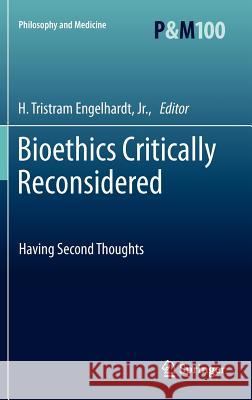Bioethics Critically Reconsidered: Having Second Thoughts » książka
Bioethics Critically Reconsidered: Having Second Thoughts
ISBN-13: 9789400722439 / Angielski / Twarda / 2011 / 202 str.
Bioethics Critically Reconsidered: Having Second Thoughts
ISBN-13: 9789400722439 / Angielski / Twarda / 2011 / 202 str.
(netto: 383,36 VAT: 5%)
Najniższa cena z 30 dni: 385,52
ok. 16-18 dni roboczych.
Darmowa dostawa!
Bioethics developed as an academic discipline during the later part of the 20th century due to a variety of factors. Crucial to this development was the increased secularization of American culture as well as the dissolution of medicine as a guild with its own professional ethics. In the context of this moral vacuum, bioethics came into existence. Its raison d' tre was opposition to the paternalism of the medical community and traditional moral frameworks, yet at the same time it set itself up as a source of moral authority with respect to biomedical decision making. Bioethics serves as biopolitics in so far as it attempts to make determinations about how individuals ought to make medical decisions and attempts to codify that in law. Paternalism and secularism are ultimately the ideology of bioethics.
Bioethics developed as an academic discipline during the later part of the 20th century due to a variety of factors. Crucial to this development was the increased secularization of American culture as well as the dissolution of medicine as a guild with its own professional ethics. In the context of this moral vacuum, bioethics came into existence. Its raison d'etre was opposition to the paternalism of the medical community and traditional moral frameworks, but alternatively at the same time it set itself up as a source of moral authority with respect to biomedical decision making. Bioethics serves as biopolitics in so far as it attempts to make determinations how individuals ought to make medical decisions and attempts to codify that in law. Paternalism and secularism are ultimately the ideology of bioethics.











